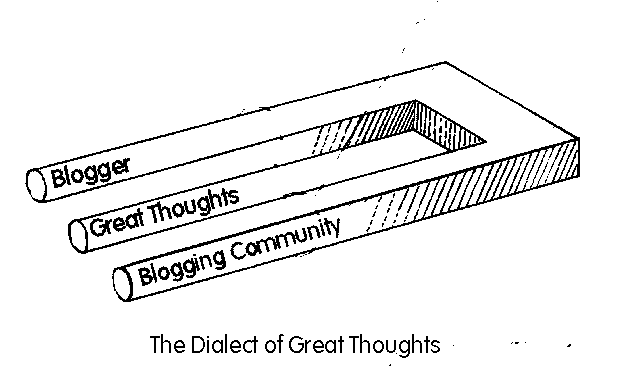While wandering various sites today I was first struck by Jonathon Delacour’s summary of an article that points out that innovators are seldom loners, but, rather, are members of a community. Jonathon points out that the blogging community seems to fulfill the author’s requirement that “… if you can combine the best of those two states—the right kind of insularity with the right kind of homogeneity—you create an environment both safe enough and stimulating enough to make great thoughts possible.” A blogger is, of course, insulated in the sense that s/he generally produces the site by himself/herself. On the other hand, most bloggers today do seem to work within a broader community linking to other bloggers and commenting on common ideas.
Later I was reading Jeff Ward’s page about the operation of dialectics, and the diagram somehow reminded me of Jonathon’s argument. I’ve modified Jeff’s illustration to fit Jonathon’s argument:

Between the poles of blogger and community, the theory is that great thoughts may arise. Personally, I don’t doubt the theory in general when it suggests that great ideas are more likely to arise when there is a supportive community. This has certainly been proven true many times in American literature. The most famous example would be in Boston where the Transcendentalists interacted with Hawthorne and Melville to produce some of America’s greatest literature. The Lost Generation’s greatest authors Hemingway and Fitzgerald also produced several masterpieces.
However, the main reason I liked Jeff’s illustration so much is that it is an ambiguous illlustration. While it appears to support Jonathon’s theory, it is also an illusion that depends on drawing conventions to produce an “impossible” figure.
While I want to believe that this theory applies to the blogging community, I have many doubts. At times the blogging community seems positively scintillating, while other times mundane issues dominate blogs for days, if not weeks. While I haven’t observed the kind of flaming that drove me from newsgroups, I have observed more than enough hostility to make me unsure that blogger communities are willing to accept innovative and challenging ideas.
The problem, of course, is how to balance stimulating ideas with a supportive community. If we choose to form a community only with those who agree with us, how will we ever produce a stimulating community that will generate new ideas. If we attempt to establish a wider community that can provide multiple perspectives, how do we avoid the criticism that can quickly degenerate into name calling and backbiting?
